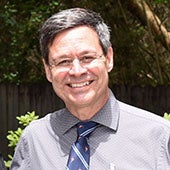Student Project Titles List
Assessing L1 Trigger Performance in Data for High-Energy Particle Collisions at the CMS Experiment
Measurements at a TeV Muon-Ion Collider

WEBSITE(S)| http://bonnerlab.rice.edu/
Assessing L1 Trigger Performance in Data for High-Energy Particle Collisions at the CMS Experiment
Measurements at a TeV Muon-Ion Collider
Research Areas
Prof. Acosta’s research program in experimental particle physics has spanned the Cornell Electron Storage Ring, the HERA electron-proton collider, the Tevatron proton-antiproton collider, and the LHC proton-proton and heavy ion collider. His research has focused on precise measurements of Standard Model processes (QCD and electroweak) as well as on searches for new particles beyond the Standard Model including leptoquarks and excited fermions. Most recently his research uncovered evidence for the rare Higgs boson decay into dimuons. Prof. Acosta is an expert on the trigger systems of particle collider experiments that perform a real-time analysis of high-rate collision data before storage to computer disk. He designed and successfully delivered the endcap muon trigger for the electronic trigger system of the CMS experiment at the LHC, and currently leads the overall CMS Trigger project.